
FOCA has been writing about light pollution for decades! We continue to hear from members who are concerned about excessive light in cottage country.

July 15, 2023 – Fade into the night: Fireflies facing threats from climate change and light pollution (Toronto Star)
January 19, 2023 – Goodbye, dark sky. The stars are rapidly disappearing from our night sky (CBC News) – Study finds 7-10% annual increase in sky brightness over 12 years.
FOCA first wrote about light pollution in our 2009 publication, Take the Plunge.
For the 2021 FOCA Lake Stewards Newsletter, we approached the original author of that light article, Robert Dick, to provide an update on the subject, and some tips for waterfront property owners. The online post below shares additional images that could not be included in the printed Newsletter format.
Please enjoy, and share, the information below:
(Note: if reproducing parts of this article, please be certain to credit the author, Robert Dick, and identify that it was excerpted from the 2021 FOCA Newsletter)
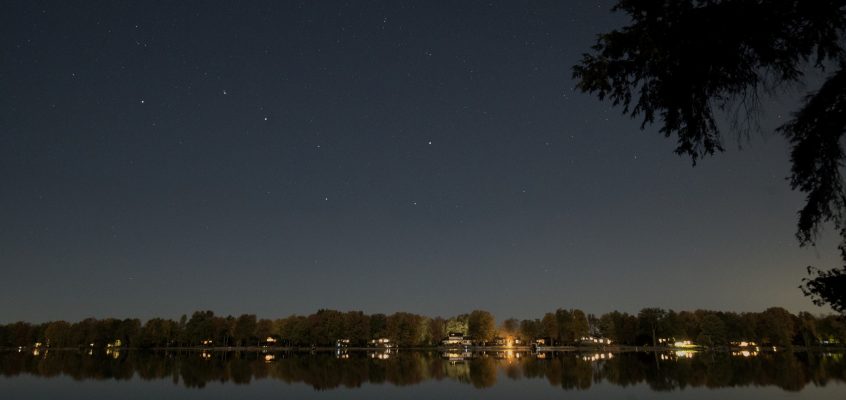
Night Lights: outdoor lighting is changing rural areas
by Robert Dick, for the 2021 FOCA Lake Stewards Newsletter The attractions of cottage country include green and blue vistas during the day, and the soundscapes and starry skies of late evening. But the latter attraction is quickly changing, and the culprit is a “green” lighting technology.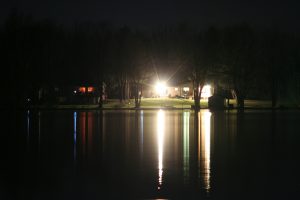 I refer to the proliferation of white-light LED fixtures. They are marketed as low energy and cheap; however, these attributes promote outdoor lighting where previously there was none. LED fixtures consume so little energy compared to the older incandescent lights that many cottagers leave them on all night and even when their cottage is vacant.
I refer to the proliferation of white-light LED fixtures. They are marketed as low energy and cheap; however, these attributes promote outdoor lighting where previously there was none. LED fixtures consume so little energy compared to the older incandescent lights that many cottagers leave them on all night and even when their cottage is vacant.
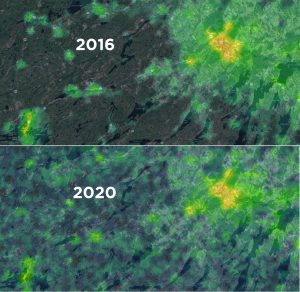 What was once a dark countryside has now become illuminated as an extension of urban lighting patterns shifts across the landscape. For example, compare these two satellite images of light proliferation in Lanark County, Eastern Ontario over a few short years. The dark areas are being overtaken by roadway and residential lighting. (source: www.lightpollutionmap.info). Something modest becomes a blight when multiplied by thousands of residences.
It is ironic that a product developed to save energy and preserve the environment is having the opposite effect: LEDs are causing a 2.2% per year increase in outdoor lighting! Within your lifetime, the sky will be twice as bright, and we will be using twice the energy for lighting.
Why does this matter? How can something as simple as a door light affect the night?
First, outdoor lighting fundamentally changes the aesthetics of the night. The night sky is featureless “black” when we are next to bright lights. It reduces the visibility for both people and animals.
Many animals don’t want outdoor lighting. It makes foraging animals vulnerable to predators. Although moonlight illuminates the countryside for about a week each month, the rest of the time there are long periods of darkness when the animals can gather food in relative safety, and star gazers and late-night walkers can enjoy the night darkness, free from glare.
The proliferation of light is caused by outdoor lights on buildings, along laneways and shoreline lighting. Whether used for landscaping or waterfront “enhancement”, outdoor lighting changes the night environment and disrupts the ecology of wildlife. It also undermines the enjoyment for those who may prefer the natural night they can’t get in the city.
What was once a dark countryside has now become illuminated as an extension of urban lighting patterns shifts across the landscape. For example, compare these two satellite images of light proliferation in Lanark County, Eastern Ontario over a few short years. The dark areas are being overtaken by roadway and residential lighting. (source: www.lightpollutionmap.info). Something modest becomes a blight when multiplied by thousands of residences.
It is ironic that a product developed to save energy and preserve the environment is having the opposite effect: LEDs are causing a 2.2% per year increase in outdoor lighting! Within your lifetime, the sky will be twice as bright, and we will be using twice the energy for lighting.
Why does this matter? How can something as simple as a door light affect the night?
First, outdoor lighting fundamentally changes the aesthetics of the night. The night sky is featureless “black” when we are next to bright lights. It reduces the visibility for both people and animals.
Many animals don’t want outdoor lighting. It makes foraging animals vulnerable to predators. Although moonlight illuminates the countryside for about a week each month, the rest of the time there are long periods of darkness when the animals can gather food in relative safety, and star gazers and late-night walkers can enjoy the night darkness, free from glare.
The proliferation of light is caused by outdoor lights on buildings, along laneways and shoreline lighting. Whether used for landscaping or waterfront “enhancement”, outdoor lighting changes the night environment and disrupts the ecology of wildlife. It also undermines the enjoyment for those who may prefer the natural night they can’t get in the city.
PRACTICAL SOLUTIONS:
1/ Changing White to Amber White is the most impactful colour of nighttime lighting. The glare from white light appears about 5 times brighter than amber light for the same wattage of lamp. Since bugs are not attracted as much by amber light, you will also reduce the pesky bugs on your property. Simply swapping out the white lamp for an amber bug light will reduce the impact of the glare.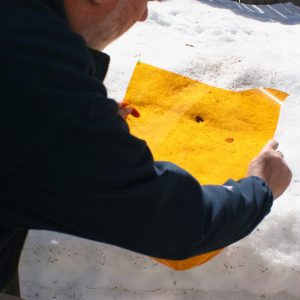 For LEDs, white light is the combination of blue plus amber. So, you can add a filter to block the blue light components. Inexpensive amber film can be used to line the inside of light fixtures such as coach lights. At the relatively low light levels after dark, our eyes perceive this colour as candlelight.
You can buy a very inexpensive sheet of filter material by Roscolux (Deep Straw #15) online (e.g., from www.bhphotovideo.com) for less than $10. Line the inside of the light fixture window or diffuser with one or two layers to achieve amber light.
2/ Shielding Exterior Building Lights
For LEDs, white light is the combination of blue plus amber. So, you can add a filter to block the blue light components. Inexpensive amber film can be used to line the inside of light fixtures such as coach lights. At the relatively low light levels after dark, our eyes perceive this colour as candlelight.
You can buy a very inexpensive sheet of filter material by Roscolux (Deep Straw #15) online (e.g., from www.bhphotovideo.com) for less than $10. Line the inside of the light fixture window or diffuser with one or two layers to achieve amber light.
2/ Shielding Exterior Building Lights
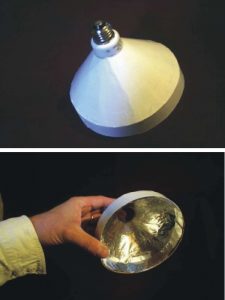 An unshielded door light can be seen for miles, yet only a fraction of the emitted light will illuminate your entrance or steps. The problem is solved by purchasing downward facing fixtures, or creating a simple DIY reflective shield. If you use the pattern found at www.csbg.ca/BLOG.HTM#22, this project is suitable for your kids or grandkids. Important notes:
An unshielded door light can be seen for miles, yet only a fraction of the emitted light will illuminate your entrance or steps. The problem is solved by purchasing downward facing fixtures, or creating a simple DIY reflective shield. If you use the pattern found at www.csbg.ca/BLOG.HTM#22, this project is suitable for your kids or grandkids. Important notes:
- Use this only for florescent or LED light bulbs (not incandescent or other bulbs that get hot when lit).
- If the bulb uses more than 60W, the material used should be metal, not cardboard.
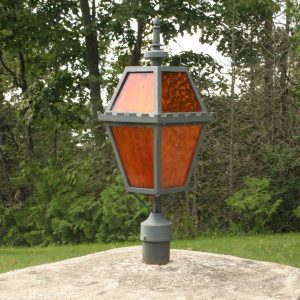 Coach lights are designed to look good in the daytime, but at night they produce a lot of glare and light trespass. Depending on the specific design, these can be modified to produce very little glare and to more uniformly light the area, which increases the visibility over the area.
As an example: this fixture has the lamp in the lower half, and the light shines out through glass in the upper and lower sections.
Coach lights are designed to look good in the daytime, but at night they produce a lot of glare and light trespass. Depending on the specific design, these can be modified to produce very little glare and to more uniformly light the area, which increases the visibility over the area.
As an example: this fixture has the lamp in the lower half, and the light shines out through glass in the upper and lower sections.
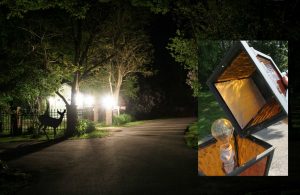 We modified it by using a screw-in plug receptacle from a local hardware store that raised the lamp into the upper section. We then cut reflective material to block the upper windows. More light is now reflected through the lower windows and onto the ground. The owner can use lower wattage lamps. During the day, the fixture did not look like it was modified but at night this modest shielding cut glare and light trespass, while increasing visibility around the entrance.
We modified it by using a screw-in plug receptacle from a local hardware store that raised the lamp into the upper section. We then cut reflective material to block the upper windows. More light is now reflected through the lower windows and onto the ground. The owner can use lower wattage lamps. During the day, the fixture did not look like it was modified but at night this modest shielding cut glare and light trespass, while increasing visibility around the entrance.
How you can help:
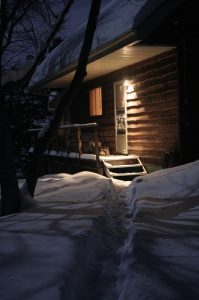 Light pollution can be easily reduced with some simple solutions:
Light pollution can be easily reduced with some simple solutions:
- Shield your light fixtures so light shines where you need it, not over your neighbour’s property. Everyone will see better without the glare.
- Use amber “bug lights” – not white light. Amber will reduce the impact of glare and will also attract fewer mosquitoes.
- Use lower wattage lamps. To judge how much light you need, go for a walk at night and approach your lights after becoming dark-adapted. This will be what the animals see. If your lights are bright, dim them down or use a lower wattage bulb.
- Turn off your outdoor lights when you don’t want to have visitors, when you go to bed, and certainly when you are away. We’ve been told to use light to make our homes safer, but without an active security system, outdoor lighting won’t protect your property, it just puts it on display for thieves and vandals.
A Municipal Example:
Worried about the impacts of light pollution in your area? You might bring this example to the attention of your municipality:
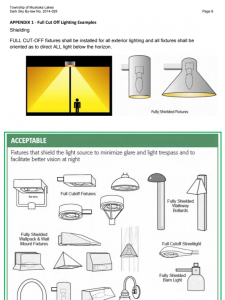 The Township of Muskoka Lakes (TML) has had a Dark Sky lighting bylaw in place since 2014, intended to “ensure responsible lighting, light pollution mitigation and conservation of the dark sky environment.” As of January 1, 2024, residents of TML are responsible for ensuring their property is dark-sky compliant, including the provision that all outdoor lighting—even on docks and boathouses—be “properly shielded with full cut-off fixtures” that only shine below the horizontal line of the shield, not outward or upwards.
The Township of Muskoka Lakes (TML) has had a Dark Sky lighting bylaw in place since 2014, intended to “ensure responsible lighting, light pollution mitigation and conservation of the dark sky environment.” As of January 1, 2024, residents of TML are responsible for ensuring their property is dark-sky compliant, including the provision that all outdoor lighting—even on docks and boathouses—be “properly shielded with full cut-off fixtures” that only shine below the horizontal line of the shield, not outward or upwards.
